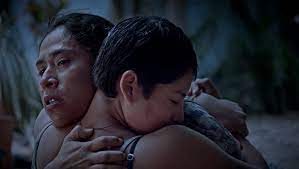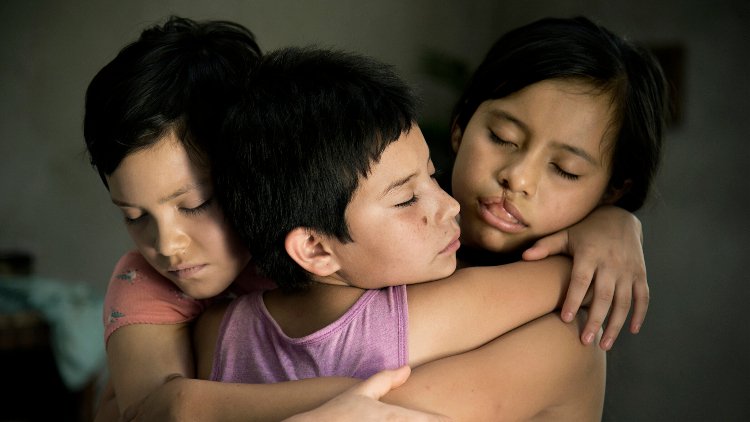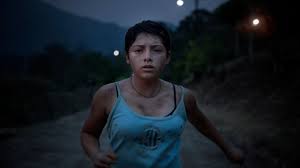The smart little girl is about eight when she starts seriously questioning her mother.
“Is it true they killed Mr. Pancho?” No, mother Rita (Mayra Batalla) tells little Ana (Ana Cristina Ordóñez González). He had to leave. His whole family, including your classmate Juana, left.
But why did they leave their cattle, their clothes, everything in their house and Juana’s bicycle?
“People leave everything behind as if they’ll come back for it some day,” Rita says, in Spanish with English subtitles. And enough with the questions.
“Prayers for the Stolen” is about the modern day slavery of mountain villages in modern Mexico. Living where poppies grow is a life sentence for the women and men there, intimidated into continuing the menial work of cutting the poppy buds and later harvesting their nectar for heroin.
The masked soldiers may come and spray with their helicopters, and make their presence felt for a few days here and there. But they always “spray everywhere except” where they’re supposed to. And when they leave, the goons in the SUVs and pickups, with their automatic weapons, roll in to renew their enslavement, extort their teachers, and take their girls when they’re of age.
“Prayers,” based on a novel by Jennifer Clement, is a richly-textured, slow-moving saga set over several years of young Ana’s life (Marya Membreño plays her as an adolescent).
It captures a tense mother-daughter relationship, fraught because of the film’s opening image. We see Rita and little Ana hand-digging a hole for her. She will hide in this any time the cartel goons show up. School is fine, her estranged father might be a lifeline if she needs to escape. But the here and now is that a mother of very limited means must worry every day for her child’s safety and the circumscribed future she faces.
But I’d be disingenuous if I didn’t tell you what a lot of critics now on Rotten Tomatoes won’t. “Slow-moving” is this movie’s Achilles heel. Screenwriter/director Tatiana Huezo drifts from patience-testing to maddening in the film’s funereal pace, from childhood into adolescence.
There are incidents here and there, but she’s made a film almost wholly out of texture. We see texture well past the moment where we get the point — Ana, Paula (Camila Gaal) and their pal with the cleft palette Maria (Blanca Itzel Pérez) are thick as thieves, almost from birth. They’re equally under threat, equally let down by a corrupt government that has ceded this section of the Sierras to bride-paying cartels.
But Paula and Ana’s mothers lie when they take their little girls in to have their hair cropped short. “Lice” has nothing to do with it, and the fact that Maria doesn’t face that is a growing-up moment for them all. Ana and Paula will have targets on their back by puberty.
From childhood, Maria’s enterprising brother Margarito has had his eye on Ana, roughhousing and teasing the way boys do. He works in the quarry with the men, and eventually in the poppy fields. As he grows up (Julián Guzmán Girón plays him as an adolescent), Ana may see his virtues, but also his shortcomings. His “trap” is different, but just as deadly.
A movie that progresses at this rate gives you a lot of time to pick over what it’s really getting at. The defenseless locals hide when trouble comes, lie to save themselves and flee if they get the chance. They make no moral judgments about the only decent paying jobs for unskilled laborers, although they have to see they’re in a cage they’re locking behind themselves.
First-time feature director Huezo — and three cheers for Netflix for giving so many the chance to get a feature film made — keeps the melodrama to a minimum and the confrontations mostly off camera. We hear shouts and shots. We and the locals see bodies.
The new teacher, who takes over when the previous one flees the threats and extortion, is something of an activist. Mister Fernando (Memo Villegas) sees promise in Ana, and convinces the locals to rig an impromptu warning bell, although he’s careful not to call it that. How long will he last.
This is what Third World autocracies look like, people in virtual chains, schools threatened by armed rednecks rolling in by the pick-up load. America’s days of looking down at this as “those people’s problem” may be over for good, thanks to the past five years.
I’m recommending this patient, immersive drama from South of the Border, but with a proviso. Don’t be shy about adjusting the playback speed in your Netflix settings. Huezo may not have a grasp of how waiting over an hour to get around to what your movie about is abusing the audience. Maybe by her second film, she’ll figure that out.
Rating: R for some language, implied violence, sexuality
Credits: Scripted and directed by Tatiana Huezo, based on a novel by Jennifer Clement. A Netflix release.
Running time: 1:50




